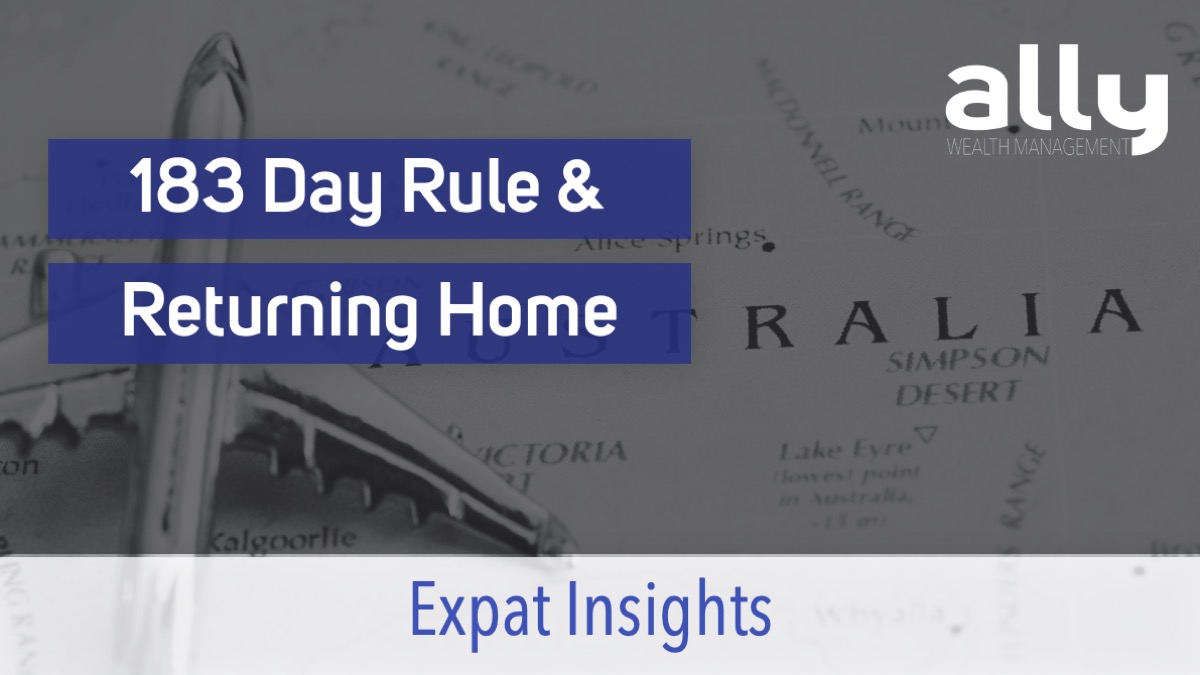The 183 Day Rule and Returning to Australia
As an Australian planning your return home, you might have heard about the 183-day rule and its impact on your tax residency. Let’s clear up some common misconceptions and help you understand what really matters when it comes to your tax status.
Understanding Tax Residency
Many returning expats believe they can manage their tax residency by simply staying in Australia for less than 183 days in a financial year. However, the reality is more nuanced. The Australian Taxation Office (ATO) looks beyond just the number of days you spend in Australia – they assess your overall intention to reside here.
What does this mean for you? Even if you’re under the 183-day threshold, actions like securing a permanent job, enrolling children in local schools, or purchasing a family home can signal your intention to reside in Australia. From the ATO’s perspective, these actions could make you a tax resident from the day you arrive.
Practical Tax Implications of Your Return
Understanding how your return affects your taxes can help you make better financial decisions. Here are the key areas to consider:
Work Bonuses and Overseas Income
The timing of when you receive income can significantly impact your tax position. For example, if you receive a work bonus after becoming an Australian tax resident, it may be taxed at Australian rates (up to 47%), even if you earned it while working overseas. Consider discussing bonus payment timing with your employer before your return.
Foreign Investments
When you become an Australian tax resident, your foreign investments are treated as if you acquired them on the day of your return, at their current market value. This creates a new starting point for any future capital gains tax calculations.
This is particularly important if you own overseas shares, property, or other investments. The market value on your return date becomes your new cost base, which could work either for or against you depending on how your investments have performed.
Superannuation Strategy
Returning home often prompts thoughts about retirement planning. Be aware that Australia has strict limits on superannuation contributions:
- Annual before-tax (concessional) contribution limit: $30,000
- Annual after-tax (non-concessional) contribution limit: $120,000
If you’re planning to transfer overseas retirement savings, such as a UK pension or US 401(k), careful planning is essential as specific tax rules apply to these transfers. It’s important to seek advice from a specialist Financial Planner who understands the treatment of these overseas vehicles.
On the superannuation front, there are also both bring-forward and carry forward contribution strategies that you can consider, that can have a significant impact on your retirement savings and your overall tax position.
Managing Currency Considerations
Moving back to Australia often involves transferring significant amounts of money between currencies. The timing of these transfers can have substantial financial implications. Exchange rate fluctuations can affect both your tax position and your purchasing power.
Consider developing a structured plan for transferring your funds. This might involve staggering transfers over time or using financial tools to lock in exchange rates.
Planning Your Return Effectively
To make your return to Australia as tax-efficient as possible:
Review Your Timing
Consider the timing of any significant income or bonuses. Where possible, receiving overseas earnings before becoming an Australian tax resident could result in significant tax savings.
Assess Your Investments
Review your investment portfolio before returning. Understanding how the deemed acquisition rules will affect your future capital gains tax position can help you make informed decisions about whether to retain or sell investments before returning.
Plan Your Retirement Strategy
If you’re bringing retirement savings back to Australia, develop a clear strategy that considers contribution caps and tax implications. This is particularly important if you have overseas pension funds.
Understand Your Residency Start Date
The date you become an Australian tax resident has far-reaching implications for your finances. If you’re unclear about when this might be, seeking professional advice before your return can help you avoid unexpected tax bills.
Making Your Move Back Home
Returning to Australia involves more than just logistics – it’s about making smart financial decisions that will affect your long-term wealth. While the tax rules might seem complex, understanding their basic principles can help you make better choices about when and how to make your move.
Remember, everyone’s situation is unique. The timing and structure of your return can significantly impact your tax position and overall financial outcome. Taking time to plan your return carefully, possibly with professional guidance, can help ensure you make the most of your move back home.
Ally Wealth Management is the trusted ally in finance for Australians at home and across the globe. As both Australian expats and residents, the founders of Ally have a unique understanding of the common personal financial challenges faced.
Book your complimentary appointment with our team at Ally Wealth Management to discuss how we can help you to achieve your financial goals.
Ally Wealth Management Pty Ltd is a Corporate Authorised Representative of Sentry Advice Pty Ltd ABN 77 103 642 888. Sentry Advice holds an Australian Financial Services Licence (AFSL) No. 227 748.
General Advice Warning: The information contained herein is of a general nature only and does not constitute personal advice. You should not act on any recommendation without considering your personal needs, circumstances, and objectives. We recommend you obtain professional financial advice specific to your circumstances.




